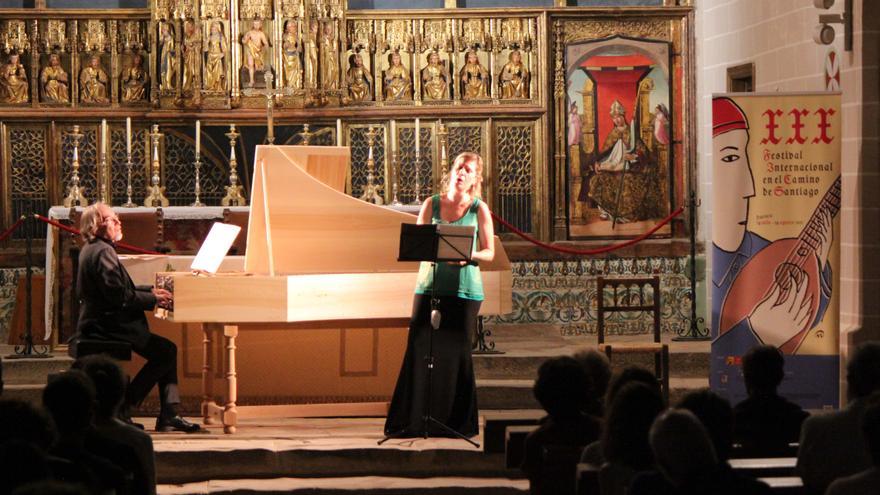–
The monumental Bolea collegiate church on Monday night hosted another of the concerts organized by the Provincial Council of Huesca (DPH) for the XXX International Festival on the Camino de Santiago. The musicians of his highness presented their program to the public there Caprices. Music in the days of the young Goya, a succession of musical pieces that were composed and premiered when the Aragonese painter was still a young man. According to the formation, “Goya was a young man, fond of music as well as all kinds of shows and pleasures that constituted the Good Life (to which he alludes in a letter to his friend Martín Zapater, when he talks about campicos and good life) “. A hobby he enjoyed before developing his deafness, and which he manifested with the use of musical images in his pictorial works.
Those in charge of interpreting these compositions were the Murcian soprano Olalla Alemán, and the Zaragoza musician Luis Antonio González on harpsichord. A minimalist formation, appropriate for chamber music, proximity music, with very intimate performances that astonished the audience, and that undoubtedly left them wanting more. The repertoire, made up of more and less well-known authors and works, began with José de Nebra from Bilbao, whom the group tells about is “surely the most relevant eighteenth-century Spanish composer, whom Goya may have met personally”. In addition, they decided to change one of their compositions for a sonata belonging to their nephew, the Sevillian organist Manuel Blasco de Nebra.
The composers José Ferrer and Joaquín Laseca also formed part of the repertoire with their sonatas.. As well as the curious and burlesque The cuckoo and the antecuco, a jota de picadillo, written by the Catalan Francisco Javier Gibert, master of the Chapel of the Monastery of the Descalzas Reales, in Madrid. A piece from 1799 that they explain is “surely the oldest preserved and known today that, receiving the name” jota “in the musical fountain, has a music that we all instantly recognize as an Aragonese jota”. A very varied program with theatrical and popular music and also more elaborate salon pieces. Likewise, the compositions by Wolfgang Amadeus Mozart and Joseph Haydn were also noteworthy. The latter, as they explain “was the most widespread composer of his time, and Goya, like any of his educated contemporaries, knew his music.”
New alternative projects
The musicians of His Highness presented this program in line with the 275th anniversary of the birth of Francisco de Goya. A program that, as they affirm, is “a journey, a path that leads through various countries and through different genres of composition.” A journey parallel to that of the walkers on the Camino de Santiago, who for them are a metaphor for life. The training is grateful for the existence of this type of festivals so that the culture can continue to live, which they consider “a good of first necessity, not only obviously so that those of us who dedicate ourselves to it can eat, but it is an inalienable spiritual food for the human life”. They know that there is still a long way to go to recover the rhythm that existed before the pandemic, but thanks to the generalization of vaccines they have been able to resume musical activity.
However, they have managed to take advantage of the times in which they were forced to reduce their number of performances in public, to start other projects. “A short time ago the documentary was released Nebra. The triumph of music by José Manuel Herraiz, in which the process of recovery of the opera is narrated Venus and Adonis from Nebra for Los Musicos de su Alteza ”, they share from the formation. In addition, shortly they will present a new album with pieces dedicated to the Italian music of the Six hundred. Finally, they also comment that “a few months ago we presented in concert our first“ historically informed ”Beethoven and soon we will offer a semi-scenic version of a Nebra zarzuela, Where there is violence there is no guilt”.
Musicians of His Highness value the increasing professionalism that exists in the world of early music. “There are more musicians with magnificent technical preparation, new soloists and very competent groups emerge every day”, they analyze from the formation, certainly not without being concerned about the idea that “currently there is more standardization and less real experimental research in the field of music. old music; Fusion fields with other types of music are being explored (for many years), but there is still much to be done in other elementary fields, such as the critical study of sources, organological research, and their application to practice ”. And since you can almost always get the positive side, they are optimistic, because this means that they will not lack work.
– .


